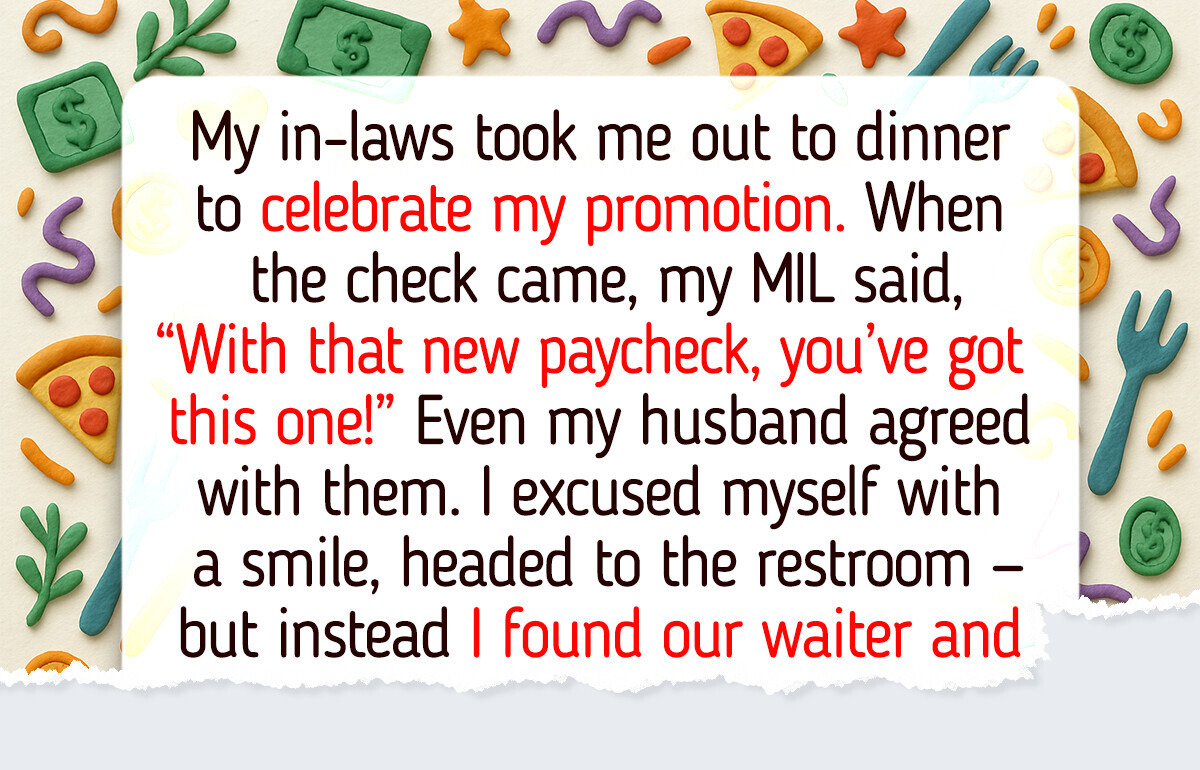Your in laws invited you so they should have paid. After their announcement perhaps you could have paid for solely your meal. Your husband needs a spine and your in laws appear to be leeches.
In-Laws Thought I’d Foot Every Bill—They Didn’t See My Payback Coming

Money has a way of stirring up hidden fault lines in families. A sudden boost in income doesn’t just change the numbers on a paycheck—it can change how relatives look at you, what they expect from you, and even how they treat you.
One woman’s recent story captured this tension perfectly, and it left our readers buzzing.
Chrissy’s letter:
I just landed a major promotion at work — the kind that doubles my salary overnight. My in-laws were thrilled and decided to throw me a “surprise” celebration at a high-end restaurant. Twelve people showed up.
The check arrives. $860. My MIL smiles sweetly and says, “Well, with that new paycheck, I’m sure you’ve got this one!” I glance at my husband, and he actually looks... proud? Like this was expected.
I excused myself with a smile, headed to the restroom — but instead of freshening up, I found our waiter. I told him we weren’t leaving yet. I asked him to box up the biggest, priciest cake they had and to write across it in frosting: “The World’s Most Opportunistic Family.” He looked at me like I’d lost my mind, but I insisted.
Back at the table, I announced there was “one more surprise.” Everyone leaned in, curious. When the cake arrived and I lifted the lid, you could’ve heard a pin drop. Faces frozen. My husband turned ghost white.
I calmly cut myself a slice, stood up, and left. I never paid the bill.
Later that night, my husband blew up at me. He said I had humiliated his family and that they only wanted to “honor” me. We haven’t spoken in three days.
Here’s the thing: I can handle generosity. What I won’t handle is being set up to bankroll everyone else’s idea of a celebration.
So... was I out of line?
—Chrissy
Sit down with your in-laws and speak openly.
What they called a “celebration” was really a setup—using flattery as cover to pressure you into footing a huge bill. The best way forward isn’t a public blow-up but a private, calm conversation. Tell them directly that it didn’t feel like kindness; it felt like a test of your wallet.
Then ask them honestly: Would you have done the same thing if it were my husband in my place?
Framing it this way keeps the focus on fairness, not drama. The goal isn’t to escalate—it’s to make sure they understand you recognized the manipulation, and that this kind of passive-aggressive ambush won’t fly again.
Question your husband where his loyalty lies, not just how he acted.

I think you did exactly the right thing!!! If you wanted to celebrate, maybe you would have rather taken a spur of theoment vacation with just your husband.
The real issue in your marriage isn’t the cake—it’s that your husband looked pleased while you were being cornered, then only got angry once his family was embarrassed.
Don’t waste energy defending the cake. Ask him instead: “Why did you smile when they put me on the spot? Why didn’t you step in?”
That reframes the conflict around what truly matters: whether he’ll have your back when pressure comes from his own family. Until he understands that, the silence between you won’t mean peace—it’ll mean distance.
Stick with humor, just make it targeted instead of destructive.
The cake was clever, savage, and impossible to forget. It also torched every bridge at the table in one move. Humor is a powerful way to expose hypocrisy—but the trick is using it without leaving yourself buried in the rubble.
Picture this: the same biting line, but saved for a group chat, a snarky blog post, or even a wink to the waiter. You’d still land the blow, but on your terms. Wit works best when it cuts clean—not when it blows up the whole room.
Set firm money rules for the future.
Your bigger paycheck doesn’t make you the family ATM. Before the next “celebration,” sit down with your husband and set clear boundaries—whether that’s agreeing on group expenses ahead of time or creating a shared “family fund” you both chip into.
That way, future gatherings feel like joint efforts, not cash grabs disguised as honor. Protecting your finances isn’t selfish—it’s smart, and it prevents resentment from festering.
Here you can read a story from a woman whose mother-in-law left her 4-year-old outside — and the unexpected twist that followed.
Comments
Related Reads
15 Times Karma Struck Back and Justice Finally Won

13 True Stories with Plot Twists So Crazy They Feel Scripted

11 Celebrity Parent-Child Duos That Prove Genetics Are Absolutely Mind-Blowing

“What Did She Do to Her Mouth?!?” Goldie Hawn Just Hit the Red Carpet, and People Did a Double Take

18 Stars Who Openly Talked About Plastic Surgery

15 Stars Who Look Like Completely Different People Today

12 Heartfelt Stories Proving Kindness Heals More Than We Realize

14 Star Comparisons That Reveal How Celebrities Really Age

8 Celebrities Who Trusted Cosmetic Surgery — and It Went Terribly Wrong

My MIL Was Sure I Was “Faking My Pregnancy” — What She Did to Prove It Left Me Speechless

“World’s Hairiest Girl” Reveals Astonishing New Look — Fully Grown and Madly in Love

Baby Girl With a Rare Smile Grew Up — What She Looks Like Today Will Leave You Speechless





